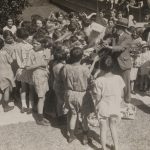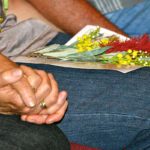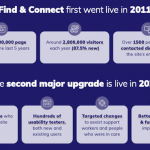Happy 100th Clanicle!
- Jun 7, 2016
- In Features
May 2016 saw the publication of the 100th edition of the Clanicle, the newsletter of Care Leavers Australasia Network (CLAN). This significant milestone in CLAN’s history made me reflect on how much has changed since we first met clannies Leonie Sheedy and Frank Golding back in 2009 on the Who Am I? project, and how much they and other clannies – Vlad Selakovic, Phyllis Cremona and Joanna Penglase in particular, but all who have participated in the Who Am I? and Find & Connect projects – have affected our world view and changed our lives for the better.
The first CLAN newsletter in October 2000 explains how Care Leavers Leonie and Joanna met, and decided to form CLAN: Leonie had answered an ad in the paper by Joanna who was looking for other people who grew up in orphanages as part of her PhD research. They were both interested in raising awareness of this neglected part of Australia’s history, and eight years later created the Care Leavers Australia Network, or CLAN. Their aims were to provide a network for Care Leavers to be able to communicate and share stories; to give Care Leavers a voice and raise awareness about the history of children in ‘care’, and to advocate for better services for Care Leavers around family tracing, education, parenting courses, counselling, and, research into the effects of growing up in care. Their lobbying efforts, along with others, eventually led to the Inquiry into Children in Institutional Care and the subsequent reports which recommended services and resources for Care Leavers, and saw the creation of the Find & Connect Services and Web Resource. You can read more about this on our About page.

CLAN has been closely involved with the Find & Connect web resource right from the beginning. Their input into the design and language has been crucial, and their stories have shaped our research. Leonie and Frank have attended all of our workshops, training sessions, meetings, usability studies, we’ve co-presented at conferences, and, written papers together. Memorable moments for me include Frank being the first Care Leaver to speak at one of our workshops of his experience of accessing his ward records; Leonie travelling to Melbourne from Geelong to help train our state-based historians, even though she was injured; Vlad travelling from Geelong to Melbourne to speak at a workshop and again to Department of Human Services (DHS) staff with his state ward file in hand, and writing a journal article with me and Cate O’Neill; Phyllis’s valuable contributions to our ‘user testing’ sessions and workshops. Clannies helped write What to Expect, one of the key-stone works on the web resource.
We’ve always been able to call on CLAN at a moment’s notice, for advice, people, and support. The Clanicle has placed great importance on Care Leavers’ stories, and this has influenced the way we work. It’s hard to explain the effect Care Leavers’ stories have had on us, you have to be there to really understand how powerful they are; they must be hard to re-tell again and again, they are hard to listen to. I’ve seen Clannies change people’s minds and long-held beliefs, significant changes in government and past providers’ policies, and the recognition and validation of these stories which are now embedded in Australia’s history.
CLAN and the Clanicle have achieved much over time, however (unfortunately) the fight for justice for Care Leavers traumatised by their time in institutions continues. The focus now is on achieving a National Redress Scheme.
Congratulations to CLAN on the 100th edition of the Clanicle. CLAN, your courage and fortitude to fight for what is right has inspired us all, and we look forward to continuing to work together to achieve great outcomes for Care Leavers.





